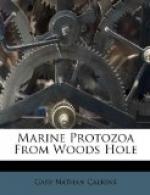Condylostoma patens Mueller. Fig. 45.
The body is elongate, somewhat sac-like, five or six times as long as broad, plastic, and frequently contains brightly colored food granules. The triangular peristome takes up the greater part of the anterior end, and the mouth is situated at the sharper angle of the triangle, about one-fourth of the total length from the anterior end. The cuticle is longitudinally striated, the lines having a slightly spiral course. They are not closely set, and fine cilia are thickly inserted along their edges. The endoplasm is granular and viscous. The motile organs consist of an adoral zone of membranelles, which stretch along the left edge of the peristome and the front edge of the body. The right edge of the peristome supports an undulating membrane. The nucleus is moniliform and extends the full length of the left side; a number of micronuclei are distributed along its course (Maupas).
Length 400 mu; diameter at widest part 105 mu. Maupas gives the length from 305 mu to 495 mu; and Stein 376 mu to 564 mu. Very common.
For a more extended account of the structures, see the excellent description by Maupas ’83.
[Illustration: Fig. 45.—Condylostoma patens.]
KEY TO THE MARINE GENERA OF STENTORIDAE.
Diagnostic characters: The peristome is relatively short and limited to the front end of the animal, so that its plane is nearly at right angles to that of the longitudinal axis of the body. The adoral zone of cilia either passes entirely around the peristome edge or ends at the right-hand edge. The surface of the peristome is spirally striated and provided with cilia. Undulating membranes are absent.
1. Peristome circular in outline; Genus
Stentor
limited to the anterior end
2. The peristome is drawn out into two Genus
Folliculina
wing-like processes; tube-dwelling
Genus STROMBIDIUM Cl. & Lach. ’58.
(Stein ’67; Buetschli ’73; Fromentel ’74; Kent ’81; Gruber ’84; Entz ’84; Maupas ’83. Buetschli ’88.)




